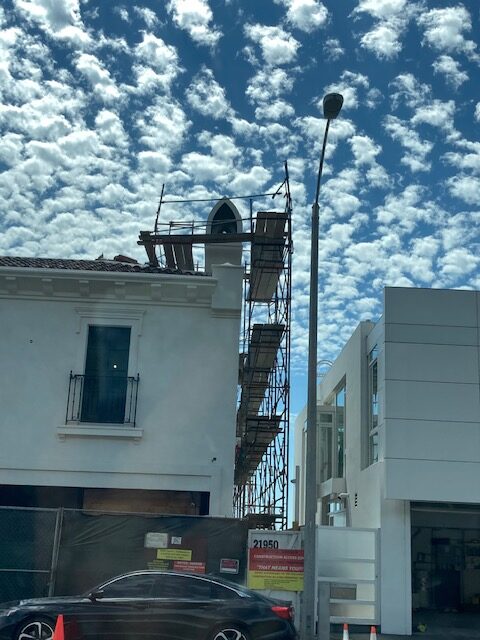
Violation of Safety Rule may not bar Workers’ Comp
Willful Violation of a known and enforced safety rule: Bad news for the injured worker
The violation of a known and enforced safety rule by an employee often serves to cause an otherwise valid workplace injury claim to be denied by the Virginia Workers’ Compensation Commission. It does not matter how serious the injuries are; if the violation of the safety rule caused the accident, then the worker cannot recover ANY workers compensation benefits. It’s an “all or nothing” proposition. Unlike the laws in some “comparative fault” jurisdictions, the injured worker would not get a percentage of his medical bills, lost wages, etc. He would get nothing if found to be in violation of a relevant, enforced safety procedure.

For example, a skyscraper window washer falls & breaks both legs because he is not wearing his company issued safety harness and fall restraint system. In such a situation, absent a very compelling reason for not being “roped in,” the worker would likely be denied benefits by the employer’s workers’ compensation insurance company. If the case went to court, the Compensation Commission judge would likely find for the employer on the basis of a “willful violation of a known and enforced safety rule.”
But does violation of a rule ALWAYS mean the injured worker will be denied benefits?
However, not all of these cases are losers, according to experienced Loudoun County & Fairfax County workers’ comp lawyer Doug Landau. There are instances where the violation of the rule has nothing to do with the injury. There are also cases where the rule was never enforced. And there are situations where there was no rule in place before the worker’s accident. Where an employer or their insurance company claims this “willful violation of a safety rule” defense, THEY have the burden of proof. According to lawyer Landau, the defense lawyers must give evidence proving:
- 1. There was a safety rule
- 2. The company enforced the safety rule previously
- 3. The violation of this rule was the cause of the accidental workplace injury.
In the 2019 case of Jones v. Crothall Laundry, the Virginia Court of Appeals stated:
“[T]he employer must establish . . . that the breach of the relevant rule proximately caused the injury.” Jones v. Crothall Laundry, 69 Va. App. 767, 775 (2019)
So, IF the company hadn’t previously enforced the rule before the claimant’s injury, the injured worker’s case may be winnable!
A roofer did not hook in to his safety rope and fell, badly injuring himself. Is there hope for his workers’ comp case?
Lawyer Landau represented a roofer who fell and fractured both ankles. The roofer and his co-workers had told their boss that it was raining, dangerous, slippery, and someone could get hurt. The boss said that as they were behind on this construction project, they had better get up on the shingles or get fired. Landau’s client was the recipient of safety awards for his work with the company over the years. But on this day, the emergency first responders noted in their reports that he was “un-hooked” when he fell. How could Landau possibly win this case?

First, Landau’s client explained that when you put the last cap piece on a roof, you have to un-hook in order to place the final shingle. Next, he stated that none of the bosses or supervisors EVER hook themselves in when they are on the roofs. Lastly, Landau investigated, discovering that other clients who were safe workers also unhooked to put the last piece in place.
“So you’re telling me there’s a chance?”
To support his case, Landau hired a private investigator to turn the tables on the workers’ comp insurance company. The investigator went to several construction sites where Landau’s client’s employer was performing rowing work. The P.I. filmed supervisors, managers and others scampering all over the rooftops without even bothering to connect their safety ropes. This supported Landau’s theory that this company did not enforce its so-called safety rule. When the case went to a hearing, the insurance defense lawyer’s jaw dropped when Landau played the videotape! His client won the case. The judge correctly found that even if the company had a “hook in” safety rule, it did not enforce it.

Lawyer Landau’s client received significant workers’ comp benefits and his medical bills were all paid. He received a significant permanency rating Award as well as lump-sum settlement. Investing in the private investigator’s “counter-surveillance” efforts paid huge dividends, enabling the Landau team to win this safe roofer’s case.
Construction worker injury after not wearing hard hat. Can the worker still win workers’ comp benefits?
Another example of where the violation of a known and enforced safety rule would not bar a Virginia Workers’ Compensation claim: a construction manager who did not wear his company issued hard hat, and was injured. The construction site had signs all over it. And the company required employees to attend weekly “toolbox safety meetings,” where they would sign a book saying they read and understood all the company’s required safety procedures. Given these details, it would seem that this manager’s case would be dead in the water.
However, if this worker’s injury was due to stepping on a rusty nail that pierced his work boot? Or an explosion that sent metal shrapnel deep into his kneecap? An explosion that badly burned his stomach? THEN his hard hat has nothing to do with the cause of the accident or the resultant injuries. In such a situation, the disabled worker should prevail.
Contact us
We take our cases seriously and want to be as knowledgeable about your case and the law as we can. That way you can get the best result possible. If you or someone you know was injured at work or while working due to no fault of your own, please give us a call (703-796-9555) or email us at Abrams Landau, Ltd.
